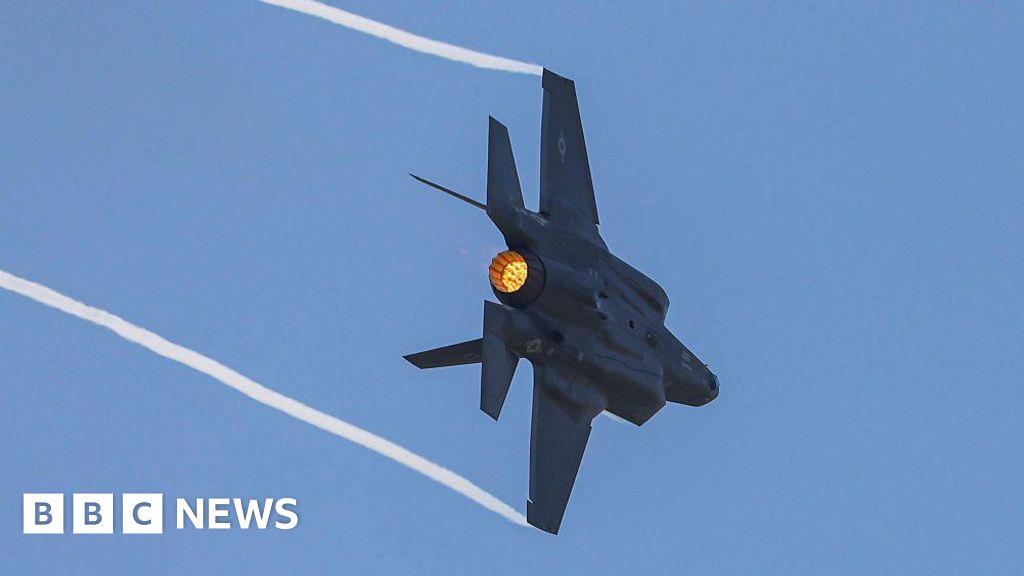The UK's High Court has rejected a case brought by campaigners trying to stop the transfer to Israel of all British-made spare parts for US-produced F-35 fighter jets, saying it didn't have the constitutional authority to intervene. The government suspended about 30 arms export licences to Israel last September because of a risk of UK-made weapons being used in violations of international law in the Gaza Strip. But the UK supplies components to a global pool of F-35s which Israel can access. The government had argued it could not pull out of the defence programme without endangering international peace. Amnesty International and Human Rights Watch expressed their dismay at the ruling. Both groups had intervened in the case. "The horrifying reality in Gaza is unfolding in full view of the world: entire families obliterated, civilians killed in so-called safe zones, hospitals reduced to rubble, and a population driven into starvation by a cruel blockade and forced displacement," said Sacha Deshmukh, chief executive of Amnesty International UK. "This judgment does not change the facts on the ground, nor does it absolve the UK government of its responsibilities under international law." The two judges said the case was not about whether the UK should supply arms and other military equipment to Israel - because the government had decided it should not. They were being asked to decide on a particular issue: whether the UK "must withdraw from a specific multilateral defence collaboration" because of the prospect that some UK-manufactured parts may be supplied to Israel and used in contravention of international law in the conflict in Gaza. "Under our constitution, that acutely sensitive and political issue is a matter for the executive which is democratically accountable to parliament and ultimately to the electorate, not for the courts," they ruled. UK industry makes 15% of every F-35, according to the Campaign Against the Arms Trade. Oxfam, which provided evidence to the court, said: "It is unconscionable that the government would continue to license the sale of components for F-35 jets knowing that they are used to deliberately attack civilians in Gaza and destroy their means of survival, including vital water supplies." The case was brought by al-Haq, a group based in the Israel-occupied West Bank, and the Global Legal Action Network against the Department for Business and Trade. The court said that Business Minister Jonathan Reynolds was "faced with the blunt choice of accepting the F-35 carve out or withdrawing from the F-35 programme and accepting all the defence and diplomatic consequences which would ensue". The government also argued pulling out of the defence programme could undermine US confidence in the UK and Nato. But human rights groups argue that the global rule of law is under threat over Gaza. "The atrocities we are witnessing in Gaza are precisely because governments don't think the rules should apply to them," said Yasmine Ahmed, UK director of Human Rights Watch. "Judicial deference to the executive in this case has left the Palestinians in Gaza without access to the protections of international law, despite the government and the court acknowledging that there is a serious risk that UK equipment might be used to facilitate or carry out atrocities against them." The government says it will continue to keep its defence export licensing under review. "The court has upheld this government's thorough and lawful decision-making on this matter," a spokesman said. Lawyers for the human rights groups are considering if they can find grounds to appeal.
UK F-35 parts exports to Israel are lawful, High Court rules
TruthLens AI Suggested Headline:
"UK High Court Declines to Block F-35 Parts Exports to Israel"
TruthLens AI Summary
The UK High Court has ruled against campaigners seeking to halt the export of British-made spare parts for US-made F-35 fighter jets to Israel. The court determined that it lacked the constitutional authority to intervene in this matter, emphasizing that the case was not about the appropriateness of arms supply to Israel but rather a specific question of whether the UK should withdraw from a multilateral defense collaboration due to concerns that some components might be used in violations of international law in Gaza. The government had previously suspended around 30 arms export licenses to Israel due to fears of their potential use in contravention of international law, yet it maintains that it is unable to withdraw from the F-35 program without jeopardizing international peace and security. The ruling has drawn criticism from human rights organizations, including Amnesty International and Human Rights Watch, which argue that the UK government has a responsibility to ensure its arms do not contribute to civilian suffering in conflict zones like Gaza.
The court's decision has sparked significant discontent among human rights advocates who highlight the ongoing humanitarian crisis in Gaza. They stress that the continued licensing of parts for F-35 jets, which are allegedly being used in attacks against civilians, is unacceptable. The judges pointed out that the political sensitivity of the issue falls under the jurisdiction of the executive branch, which is accountable to Parliament and the electorate, and not the courts. The ruling was seen as a critical moment for human rights in relation to arms exports, with advocates arguing that it undermines the global rule of law. As the UK government reviews its defense export licensing, it faces pressure from various organizations to ensure that its military exports do not facilitate human rights abuses. Legal representatives for the human rights groups involved are currently assessing the possibility of an appeal against the court's decision, reflecting ongoing tensions between defense policy and human rights obligations.
TruthLens AI Analysis
You need to be a member to generate the AI analysis for this article.
Log In to Generate AnalysisNot a member yet? Register for free.
